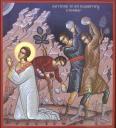
My soul is now very light, fresh out of the box, with the scent of a newborn.
I just professed my faith and had my first confession (and absolution.) Thanks be to God!
“O loving Lord Jesus Christ, I, a sinner, not presuming on my own merits but relying on Your mercy and goodness, approach with fear and trembling the table of Your most sweet feast. Both my heart and body are stained with many sins, neither have I kept strict guard over my thoughts and my tongue. Wherefore, O gracious God, O dread Majesty, I, a wretched creature caught in difficulties, have recourse to You, the fount of mercy; to You do I hasten that I may be healed, and take refuge under Your protection; and I ardently desire to have Him as my Savior, Whom I am unable to face as my Judge. To You, O Lord, I show my wounds, to You I lay bare my shame. I know that my sins are many and grievous, and hence I am afraid. I trust in Your countless mercies. Look upon me, therefore, with the eyes of Your mercy, O Lord Jesus Christ, eternal King, God and Man, crucified for men. Hearken to me whose trust is in You, have mercy upon me, who am full of sin and misery, O fount of mercy that will never cease to flow. Hail, saving Victim, offered for me and all mankind upon the gibbet of the cross. Hail, noble and precious Blood, flowing form the wounds of my crucified Lord Jesus Christ, and washing away the sins of the whole world. Remember, O Lord, Your creatures whom You have redeemed with Your Blood. I am sorry because I have sinned; I desire to make amends for what I have done. Take away from me, therefore, O most merciful Father, all my iniquities and sins; that, being cleansed both in body and soul, I may worthily taste of the Holy of Holies. Grant that this holy sacrifice of Your Body and Blood, of which I though unworthy, purpose to partake, may obtain the remission of my sins, the perfect cleansing of my offenses, the banishment of all evil thoughts, the renewal of all holy desires, the accomplishment of works pleasing to You, and the strongest protection of soul and body against the wiles of my enemies. Amen.” [Prayer of St. Ambrose (d. 397)]
IX. THE EFFECTS OF THIS SACRAMENT
1468 “The whole power of the sacrament of Penance consists in restoring us to God’s grace and joining us with him in an intimate friendship.”73 Reconciliation with God is thus the purpose and effect of this sacrament. For those who receive the sacrament of Penance with contrite heart and religious disposition, reconciliation “is usually followed by peace and serenity of conscience with strong spiritual consolation.”74 Indeed the sacrament of Reconciliation with God brings about a true “spiritual resurrection,” restoration of the dignity and blessings of the life of the children of God, of which the most precious is friendship with God.75
1469 This sacrament reconciles us with the Church. Sin damages or even breaks fraternal communion. The sacrament of Penance repairs or restores it. In this sense it does not simply heal the one restored to ecclesial communion, but has also a revitalizing effect on the life of the Church which suffered from the sin of one of her members.76 Re-established or strengthened in the communion of saints, the sinner is made stronger by the exchange of spiritual goods among all the living members of the Body of Christ, whether still on pilgrimage or already in the heavenly homeland:77
- It must be recalled that . . . this reconciliation with God leads, as it were, to other reconciliations, which repair the other breaches caused by sin. The forgiven penitent is reconciled with himself in his inmost being, where he regains his innermost truth. He is reconciled with his brethren whom he has in some way offended and wounded. He is reconciled with the Church. He is reconciled with all creation.78
1470 In this sacrament, the sinner, placing himself before the merciful judgment of God, anticipates in a certain way the judgment to which he will be subjected at the end of his earthly life. For it is now, in this life, that we are offered the choice between life and death, and it is only by the road of conversion that we can enter the Kingdom, from which one is excluded by grave sin.79 In converting to Christ through penance and faith, the sinner passes from death to life and “does not come into judgment.”80
73 Roman Catechism, II,V,18.
74 Council of Trent (1551): DS 1674.
75 Cf. Lk 15:32.
76 Cf. 1 Cor 12:26.
77 Cf. LG 48-50.
78 John Paul II, RP 31,5.
79 Cf. 1 Cor 5:11; Gal 5:19-21; Rev 22:15.
80 Jn 5:24.
Read Full Post »





























